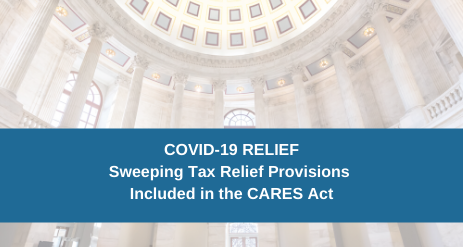
In an effort to help businesses and individuals weather the economic storm created by the coronavirus shutdowns, the Coronavirus Aid, Relief, and Economic Security (CARES) Act, which Congress passed and the President signed on March 27, included many provisions easing restrictions imposed by the Internal Revenue Code. Key changes relating to Individual taxpayers are highlighted below. Changes oriented toward businesses have been covered in a separate Alert.
Recovery rebates for individuals. To help individuals meet financial needs during this time of crisis, the federal government will send up to $1,200 to eligible single taxpayers and $2,400 to married couples filing joint returns. An additional $500 payment will be sent to taxpayers for each qualifying dependent child under age 17. For individual taxpayers with adjusted gross income (AGI) over $75,000, joint filers with AGI over $150,000 and head of household filers with AGI over $122,500, the payment amount is phased out, at a rate of 5% of the amount exceeding this threshold. Under these rules, the rebate is completely phased-out for a single filer with AGI exceeding $99,000, for a joint filer with no children with AGI exceeding $198,000, and for a head of household with one child, with AGI exceeding $146,500. Most individuals will not have to take any action to receive a rebate. IRS will compute the rebate based on a taxpayer’s 2019 tax return (or 2018, if the 2019 return has not yet been filed). Note that rebates are payable whether or not any tax was owed on the 2019 (or 2018) return.
Waiver of 10% early distribution penalty. Recognizing that individuals may need to turn to their IRAs and other retirement plans for funds to help them through the crisis, the CARES Act waives the 10% penalty tax on early distributions from IRAs and defined contribution plans (such as 401(k) plans) for any person who (or whose family) is infected with the coronavirus or who is economically harmed by the pandemic. This relief applies to anyone (i) who is diagnosed with the coronavirus by a test approved by the Centers for Disease Control and Prevention, (ii) whose spouse or dependent is diagnosed with coronavirus by such a test or (iii) who experiences adverse financial consequences as a result of being quarantined, furloughed or laid off or having work hours reduced due to the pandemic, being unable to work due to lack of child care due to the coronavirus, closing or reducing hours of a business owned or operated by the individual due to the coronavirus, or other factors as may be specified by the Secretary of the Treasury. Penalty-free distributions are limited to $100,000, and may be re-contributed to the plan or IRA at a later time. Income arising from the distributions is spread out over 3 years unless the taxpayer elects otherwise. Employers are permitted to amend defined contribution plans to provide for these distributions. Additionally, defined contribution plans are permitted more flexibility in the amount and repayment terms of loans to employees affected by the coronavirus and attendant economic distress.
Waiver of required distribution rules. Required minimum distributions that otherwise would have to be made in 2020 from defined contribution plans (such as 401(k) plans) and IRAs are waived. This includes distributions that would have been required by April 1, 2020, due to the account owners reaching the age of 70 1/2 in 2019.
Charitable deduction liberalization. The CARES Act allows an individual taxpayer to take a $300 above-the-line deduction for cash contributions made, generally, to public charities in 2020. This rule overrides the limitation imposed by the 2017 tax act barring charitable contribution deductions for taxpayers filing with the standard deduction. An individual taxpayer’s ability to claim itemized deductions for charitable deductions in any year has been subject to a ceiling equal to 60% of the taxpayer’s modified adjusted gross income for the year. The CARES Act removes this limitation for cash contributions made, generally, to public charities in 2020. For both of these changes, no connection needs to be shown between the contributions and the impact of the coronavirus.
High Deductible Plan Remote Care Services. The CARES Act allows high deductible health plans to pay for expenses in 2020 for tele-health and other remote health care services without regard to the deductible amount for the plan.
Nonprescription Medical Products. For amounts paid after December 31, 2019, the CARES Act allows amounts paid from Health Savings Accounts and Archer Medical Savings Accounts to be treated as paid for medical care even if they are not paid under a prescription.
Exclusion for employer payments of student loans. An employee currently may exclude $5,250 from income for benefits from an employer-sponsored educational assistance program. The CARES Act expands the definition of expenses qualifying for the exclusion to include employer payments of student loan debt made before January 1, 2021.
For questions about this and other COVID-19 related tax developments, please contact Bob Canter or TJ Wilkinson at Shulman Rogers.
The contents of this Alert are for informational purposes only and do not constitute legal advice. If you have any questions about this Alert, please contact the Shulman Rogers attorney with whom you regularly work or a member of the Shulman Rogers Tax Law Group.
Stay up to date with all the latest news and events.